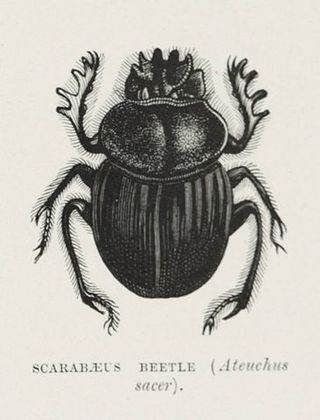Freudian Psychology
Deep Memories of Insects
What creatures infest the dark recesses of the mind?
Posted February 17, 2017

The idea that insects lurk deep within the human psyche draws upon the psychological work of Sigmund Freud and Carl Jung. Just as Darwin didn’t understand the mechanism of inheritance but understood its importance to the origin of species, neither Freud nor Jung grasped how insects had infested the human psyche. However, they understood that our thoughts about these creatures were deeply embedded, even if the origin of these thoughts awaited the development of evolutionary psychology.
Sometimes a cigar is just a cigar, but a cigarette beetle (Lasioderma serricorne) might have been another matter for Freud. Insects symbolized psychological problems. For example, Freud proposed that the fear of being bitten by a spider represented the fear of being punished by one’s father (other psychoanalysts favor the spider as symbolizing a devouring or castrating mother, given that some female spiders cannibalize their mates).
Freud delved into the histories of his patients in the belief that associations of insects with neuroses developed over time. In a classic case, a disturbed fellow recounted that the “opening and shutting of the butterfly’s wings while it was settled on the flower [looked] like a woman opening her legs.” With evident delight, Freud hastened to note that the stick-like projections from the swallowtail’s wings “might have had the meaning of genital symbols.”
Freud was perplexed by the frequency with which insects were the subject of his patients’ phobias. Either there was a remarkable coincidence between these creatures and traumatic events in peoples’ lives or some much deeper sort of memory—not dependent on individual experience—was being accessed. The latter explanation became the life’s work of Freud’s successor.
Carl Jung investigated our primal, collective memories or "archetypes"—the “inherited memories from the evolutionary past of the race.” Jung proposed that our basic drives could be seen in the evolved behavior insects. He argued that humans should heed instinctual knowledge: “If man sometimes acted as certain insects do he would possess a higher intelligence than at present.”
Jung’s most famous insect-derived moment came while counseling a woman who described a dream about having been given a golden scarab—the ancient Egyptians’ sacred symbol of rebirth. At that moment, a local species of scarab beetle flew into the room and its arrival catalyzed a therapeutic breakthrough.
Jung maintained that we can access the deep wisdom of the unconscious through archetypal symbols encountered in dreams. For example, queen ant was the female equivalent of a father who maintains his daughters as puppets by impeding their sexual and emotional maturation—an entomologically informed, if somewhat bizarre, interpretation.
Not many evolutionary psychologists would count the psychoanalysts among their ranks, but the two groups share an understanding that we possess inborn proclivities. The latter group might have missed the mechanism accounting for these tendencies, but the history of science is often a matter of being right for the wrong reasons.


